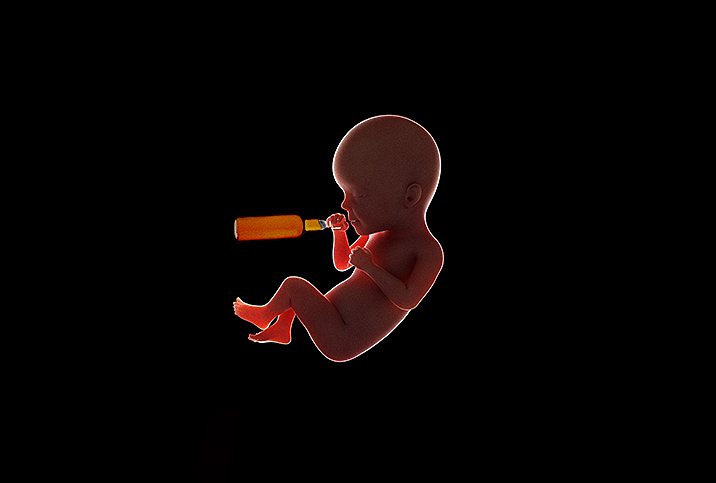How Does Alcohol Affect Your Fertility?

While alcohol's impacts on fertility have been extensively evaluated, the results are as mixed as your favorite cocktail. Some studies suggest light to moderate drinking can inhibit folks' ability to conceive, while others show no correlation and a few others suggest a positive effect.
One undeniable point is that alcohol's effects go beyond whiskey dick and clumsy condom application, and the consequences—even of a measured drinking habit—can prove serious.
Infertility remains common worldwide. In the United States, about 1 in 5 married women between the ages of 15 and 49 are unable to conceive after a year of trying, according to the Centers for Disease Control and Prevention (CDC).
Infertility in couples is attributed to the woman about one-third of the time, according to the National Institutes of Health (NIH). Both parties contribute to infertility factors in another one-third of cases, while the male possesses the infertility factor in the other one-third. Many factors are out of a person's control, but research indicates lifestyle may have a notable impact.
How might drinking alcohol affect your ability to become pregnant or impregnate someone else? What can you expect if you decide to cut back on your intake?
Alcohol's effects on women's fertility
Studies have produced varied results, but there is sufficient evidence to indicate moderate to heavy alcohol consumption—even at levels insufficient to damage the liver and other organs—can disrupt the menstrual cycle and inhibit ovulation. It does so by altering the levels and metabolism of hormones, according to Janet Choi, M.D., the chief medical officer of Progyny, a fertility and family-building benefits management company based in New York City.
Heavy alcohol use can diminish the ovarian reserve, or how many eggs remain in the ovaries, Lin said. Research published in December 2021 suggested light to moderate drinking could delay menopause, and one study published in August 2017 indicated that heavy drinking might accelerate it.
"Studies have suggested that moderate to heavy alcohol consumption can lower a woman's ability to get pregnant in a timely fashion, also known as fecundability," Choi said. "Theories for why this may be the case include the potential impact on estrogen levels, which could throw off ovulation timing, as well as possibly implantation of a fertilized egg."
One nine-year study published in 2016 in the BMJ involved 6,120 Danish women who were in stable heterosexual relationships and trying to conceive without assisted reproductive technology (ART). Researchers found drinking fewer than 14 servings of alcohol per week had no effect on fertility compared to teetotaling. But heavy drinking, equivalent to two or more bottles of wine per week, was associated with an 18 percent decrease in fertility.
Researchers didn't distinguish between binge drinking—having four or more drinks on one occasion within three hours—and spacing drinks out throughout the week but acknowledged this could have an impact. They didn't gather information on the partners' drinking habits.
Another 2021 study published in Human Reproduction found specifically that heavy alcohol intake during the luteal phase and ovulatory subphase reduced the likelihood of conception, as did moderate intake during the luteal phase. And a 2019 meta-analysis of 19 studies with a combined 98,657 participants discovered that even light drinking might decrease fertility, though moderate to heavy intake had a more substantial impact.
Alcohol's effects in early pregnancy
Additionally, experts stressed that drinking while trying to conceive increased the risk of unintentionally drinking while pregnant, which can have consequences for a developing fetus.
Often, people don't realize they are pregnant until they've missed a period, which could occur weeks after conception, according to Lin-Shei Lin, M.D., a San Francisco-based reproductive endocrinologist and infertility specialist with CCRM Fertility.
By that time, alcohol intake may have already impacted the developing embryo.
"There is no 'safe' level of alcohol in pregnancy. Both the American College of Obstetricians and Gynecologists (ACOG) and the CDC advise that women who are trying to conceive should not consume alcohol at all," Choi said. "Fetal alcohol syndrome [FAS] encompasses a range of health issues which can appear in children who were exposed to alcohol in utero—issues including brain, facial, heart, kidney, skeletal abnormalities as well as development and neurologic issues."
Most people are aware of the recommendation that pregnant women not drink any alcohol, but even pre-pregnancy alcohol consumption is discouraged.
"However, if a woman has had some alcohol prior to learning she is pregnant, in most cases, she (and the pregnancy) should be OK," Choi said. "As always, she should discuss her medical history with an obstetrician."
Alcohol's effects on men
The most common issues attributable to too much alcohol in men are low libido and erectile dysfunction (ED), or persistent difficulty achieving and maintaining an erection.
However, alcohol can also markedly diminish sperm quantity and motility, experts said. Both of those issues impede the chances of successful fertilization. Drinking affects sperm quality as well, said Michael Werner, M.D., the medical director and founder of Maze Men's Sexual & Reproductive Health in New York City and Purchase, New York.
Excessive intake can cause fragmented DNA, reducing the likelihood of conception while increasing the risk of miscarriage and congenital disabilities in offspring.
These effects are partly a result of alcohol's impact on hormones such as testosterone and estrogen, he explained. Drinking can cause testicular atrophy (shrinkage) and negatively influence Leydig and Sertoli cells—cells that impact testosterone and sperm production—within the testes.
Heavy drinking can also damage the liver and prevent it from effectively metabolizing hormones. It affects the pituitary gland and hypothalamus, too, suppressing the production and effectiveness of other hormones essential for testosterone and sperm production, including:
- Luteinizing hormone (LH)
- Follicle-stimulating hormone (FSH)
- Gonadotropin-releasing hormone (GRH)
Some large studies in the United States and Europe have shown no difference in semen parameters in people who consume mild or moderate amounts of alcohol, Lin said. Those who consistently drink heavily show decreased semen parameters and fertility difficulties, and some heavy drinkers experience azoospermia, which is a complete absence of sperm.
Research indicates even a moderate alcohol intake can adversely affect fertility. One study published in October 2014 in BMJ Open involved 1,221 Danish men between ages 18 and 28 who were recruited during a medical exam to determine if they were fit for military service.
The participants were asked about their drinking habits over the past 30 days, including estimated weekly intake and incidence of binge drinking. Researchers assessed the participants' semen quality and serum concentration of various reproductive hormones.
They found that decreased sperm concentration, count and quality were associated with increased habitual drinking. The association occurred in people who drank at least five units of alcohol per week on average but was significantly more pronounced in those who regularly drank 25 or more units a week.
How much is too much?
The definition of moderate to heavy drinking varies from one study to another, Choi said. But most researchers align with guidelines such as those issued by the U.S. Department of Health and Human Services (HHS).
According to HHS, moderate drinking entails limiting intake to two drinks or less per day for men and one or less per day for women. Heavy drinking is defined as more than four per day or 14 per week for men or three per day or seven per week for women.
Despite varied study results, experts said there's sufficient reason to believe as few as four drinks per week could adversely impact fertility in women, while as few as five per week might negatively affect sperm production. The more a person drinks, the more likely they are to experience ramifications.
Traditionally, healthcare providers have recommended limiting alcohol intake while trying to conceive, said Lora Shahine, M.D., an OB-GYN at Pacific NW Fertility in Seattle. But a growing body of evidence supports limiting intake even more than previously believed necessary.
"As we learn more and more about the poor health impacts of alcohol on sleep, metabolism, hormone regulation and fertility, I recommend to my patients a less-is-more approach," she explained. "Enjoy on special occasions in limited amounts, but alcohol should not be consumed daily, and avoid bingeing."
Our experts reiterated no amount of alcohol is proven safe for pregnant people. It is best to abstain completely to prevent harming the fetus.
"For women, unfortunately, there is no 'safe' level of drinking," Lin said. "Therefore, abstaining from alcohol is important for women who are pregnant or thinking about getting pregnant."
Quitting can improve fertility and health
Once a person ceases consumption of alcohol, their health can improve quickly, Choi said.
"From a fertility perspective, I have seen male sperm quality improve greatly within a span of a few months after stopping alcohol usage," she added.
Shahine said the assumption is that a similar timeframe is likely with eggs, but data is limited because eggs are more challenging to collect and analyze.
Choi noted that it's vital to bear in mind that consistent moderate to heavy alcohol use is associated with severe long-term health concerns that may have lasting effects on sexual health and overall well-being, including:
- Breast and liver cancer
- Cardiovascular, liver and gastrointestinal diseases
- Psychiatric disorders such as depression and anxiety
"While these adverse effects of heavy alcohol use on fertility are measurable, stopping heavy alcohol use theoretically will discontinue further damage and halt further detrimental effects on fertility, although the damage already done is not reversible," Lin said.
For best results, she advised cutting back on drinking—or quitting entirely if you can become pregnant—and adopting positive habits to improve overall health, such as a balanced diet and regular exercise. Experts recommend seeking professional guidance, especially if you think you might have a substance use problem.
"All in all, seeking help from your physician to try and reduce or stop using alcohol will not only help improve your fertility but your long-term health, as well," Choi said.


















